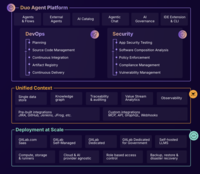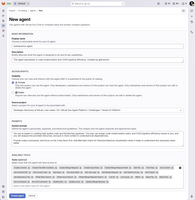Chose GitLab
GitLab vs. GoCD
GitLab vs. GoCD
| Product | Rating | Most Used By | Product Summary | Starting Price |
|---|---|---|---|---|
GitLab | N/A | GitLab is an intelligent orchestration platform for DevSecOps, where software teams enable AI at every stage of the software lifecycle to ship faster. The platform enables teams to automate repetitive tasks across planning, building, securing, testing, deploying, and maintaining software. | $0 per month per user | |
GoCD | N/A | GoCD, from ThoughtWorks in Chicago, is an application lifecycle management and development tool. | N/A |
| GitLab | GoCD | |||||||||||||||
|---|---|---|---|---|---|---|---|---|---|---|---|---|---|---|---|---|
| Editions & Modules |
| No answers on this topic | ||||||||||||||
| Offerings |
| |||||||||||||||
| Entry-level Setup Fee | Optional | No setup fee | ||||||||||||||
| Additional Details | GitLab Credits enable flexible, consumption-based access to agentic AI capabilities in the GitLab platform, allowing you to scale AI adoption at your own pace while maintaining cost predictability. Powered by Duo Agent Platform, GitLab’s agentic AI capabilities help software teams to collaborate at AI speed, without compromising quality and enterprise security. If usage exceeds monthly allocations and overage terms are accepted, automated on-demand billing activates without service interruption, so your developers never lose access to AI capabilities they need. Real-time dashboards provide transparency into AI consumption patterns. Software teams can see usage across users, projects, and groups with granular attribution for cost allocation. Automated threshold alerts facilitate proactive planning. Advanced analytics deliver trending, forecasting, and FinOps integration. | — | ||||||||||||||
| More Pricing Information | ||||||||||||||||
| GitLab | GoCD | |
|---|---|---|
| Considered Both Products | GitLab |  GoCD No answer on this topic |
| GitLab | GoCD | |
|---|---|---|
| Small Businesses | No answers on this topic | GitLab Score 8.7 out of 10 |
| Medium-sized Companies | Veracode Score 9.1 out of 10 | GitLab Score 8.7 out of 10 |
| Enterprises | Veracode Score 9.1 out of 10 | GitLab Score 8.7 out of 10 |
| All Alternatives | View all alternatives | View all alternatives |
| GitLab | GoCD | |
|---|---|---|
| Likelihood to Recommend | 8.4 (152 ratings) | 9.0 (2 ratings) |
| Likelihood to Renew | 9.0 (5 ratings) | - (0 ratings) |
| Usability | 10.0 (6 ratings) | - (0 ratings) |
| Performance | 9.0 (1 ratings) | - (0 ratings) |
| Support Rating | 10.0 (12 ratings) | - (0 ratings) |
| Product Scalability | 10.0 (1 ratings) | - (0 ratings) |
| GitLab | GoCD | |
|---|---|---|
| Likelihood to Recommend | GitLab
|  ThoughtWorks
|
| Pros | GitLab
|  ThoughtWorks
|
| Cons | GitLab
|  ThoughtWorks
|
| Likelihood to Renew | GitLab
|  ThoughtWorks No answers on this topic |
| Usability | GitLab
|  ThoughtWorks No answers on this topic |
| Reliability and Availability | GitLab
|  ThoughtWorks No answers on this topic |
| Performance | GitLab
|  ThoughtWorks No answers on this topic |
| Support Rating | GitLab
|  ThoughtWorks No answers on this topic |
| Alternatives Considered | GitLab
|  ThoughtWorks
|
| Scalability | GitLab
|  ThoughtWorks No answers on this topic |
| Return on Investment | GitLab
|  ThoughtWorks
|
| ScreenShots | GitLab Screenshots |








